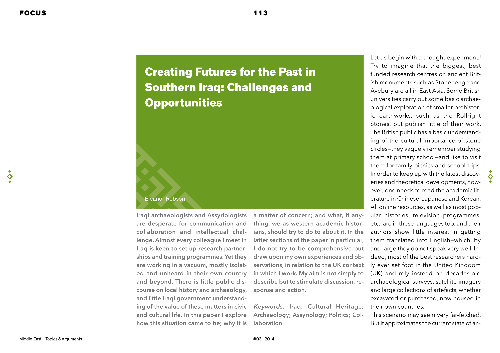Creating Futures for the Past in Southern Iraq: Challenges and Opportunities
Iraqi archaeologists and Assyriologists are desperate for communication and collaboration and intellectual challenge. Almost every colleague I meet in Iraq is keen to set up research partnerships and training programmes. Yet they are working in a vacuum, mostly isolated and unheard in their own coun...
Furkejuvvon:
| Publikašuvnnas: | Middle East - Topics & Arguments |
|---|---|
| Váldodahkki: | |
| Materiálatiipa: | Artikel (Zeitschrift) Daten |
| Giella: | eaŋgalasgiella |
| Almmustuhtton: |
Philipps-Universität Marburg
2014
|
| Fáttát: | |
| Liŋkkat: | Liŋkkat Čájet merkoša |
| Fáddágilkorat: |
Lasit fáddágilkoriid
Eai fáddágilkorat, Lasit vuosttaš fáddágilkora!
|
| Čoahkkáigeassu: | Iraqi archaeologists and Assyriologists are desperate for communication and collaboration and intellectual challenge. Almost every colleague I meet in Iraq is keen to set up research partnerships and training programmes. Yet they are working in a vacuum, mostly isolated and unheard in their own country and beyond. There is little public discourse on local history and archaeology, and little Iraqi government understanding of the value of these matters in civic and cultural life. In this paper I explore how this situation come to be; why it is a matter of concern; and what, if anything, we as western academic historians, should try to do to about it. In the latter sections of the paper in particular, I do not try to be comprehensive but draw upon my own experiences and observations, in relation to the UK context in which I work. My aim is not simply to describe but to stimulate discussion, response and action. |
|---|---|
| DOI: | 10.17192/meta.2014.3.2175 |
 Publikationsserver
Publikationsserver